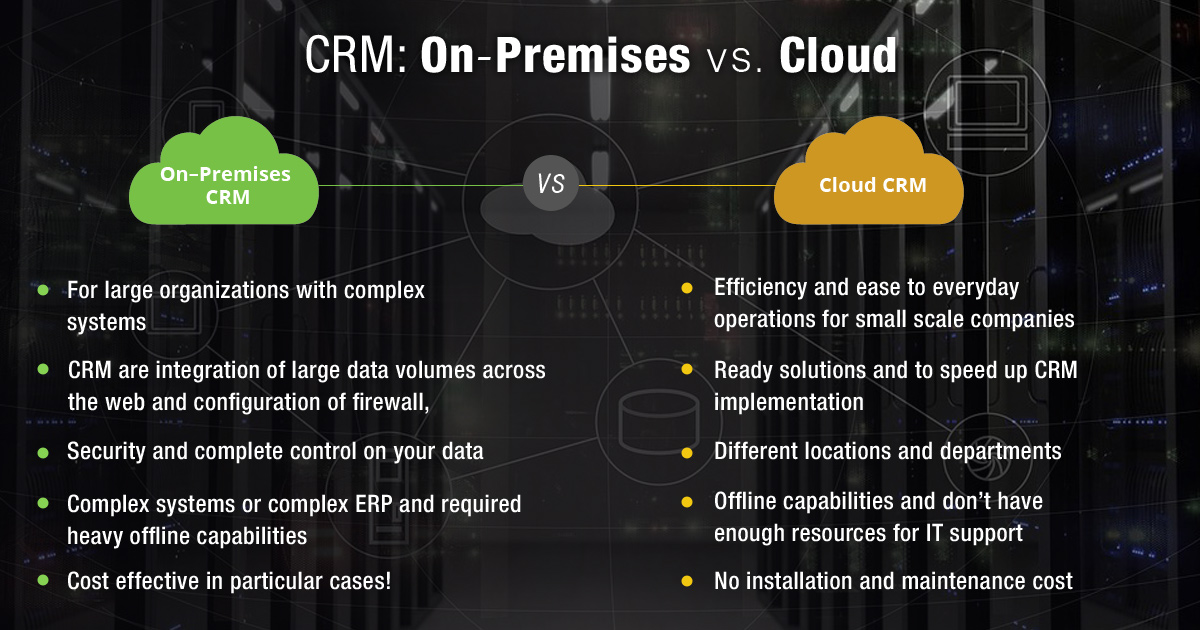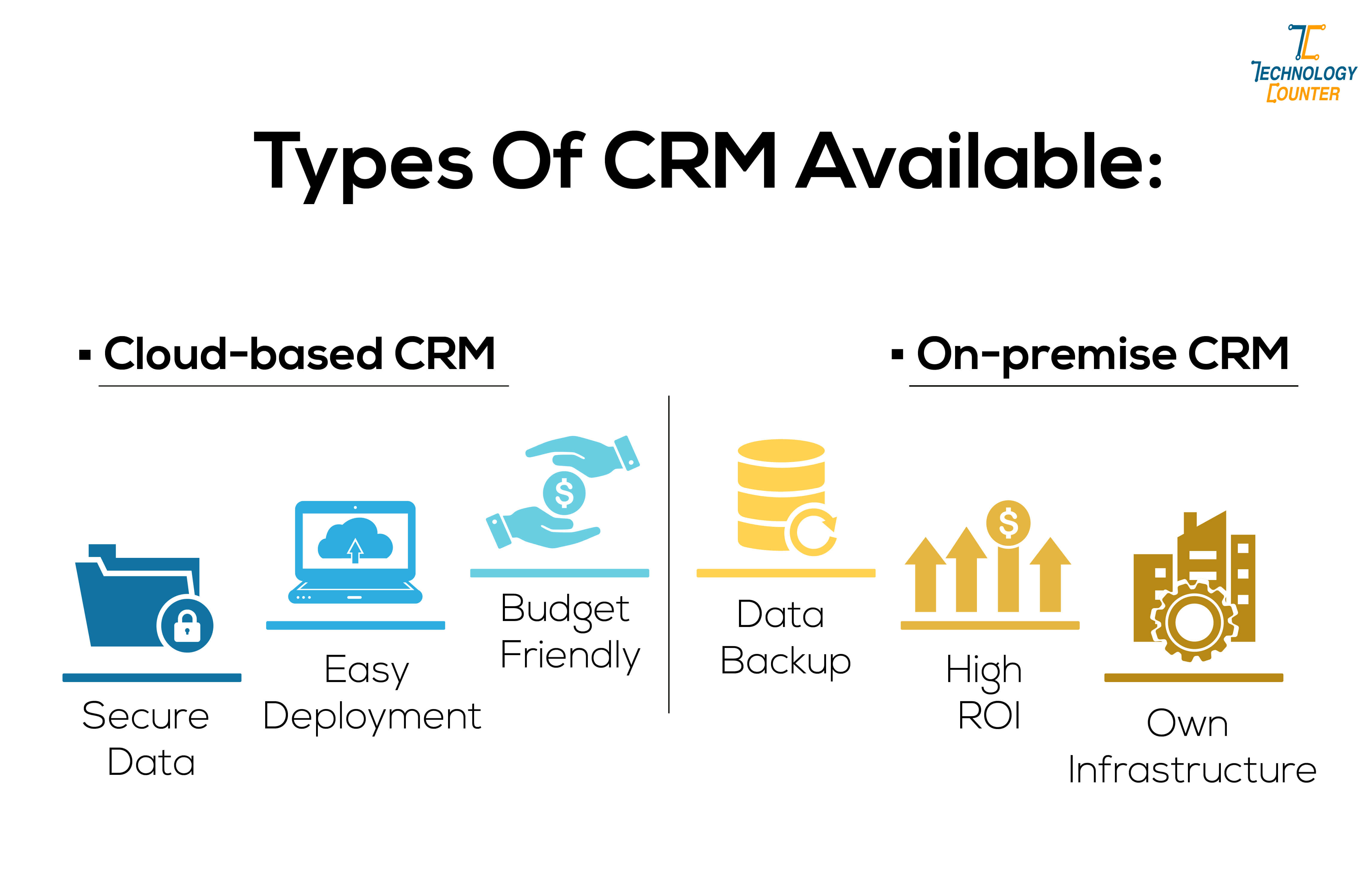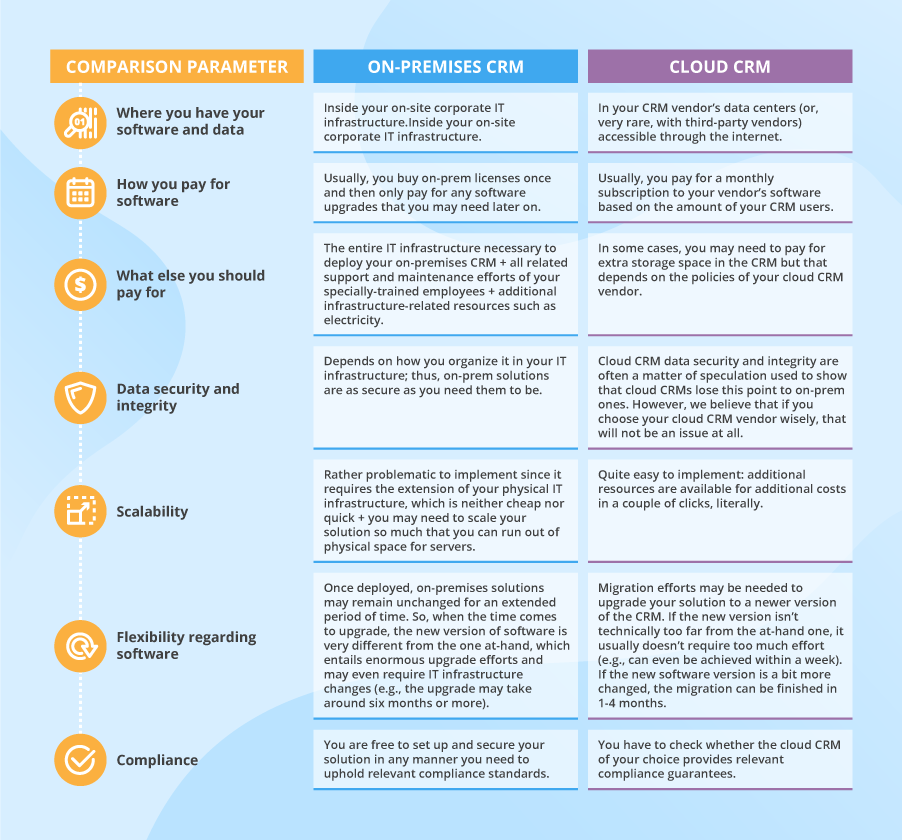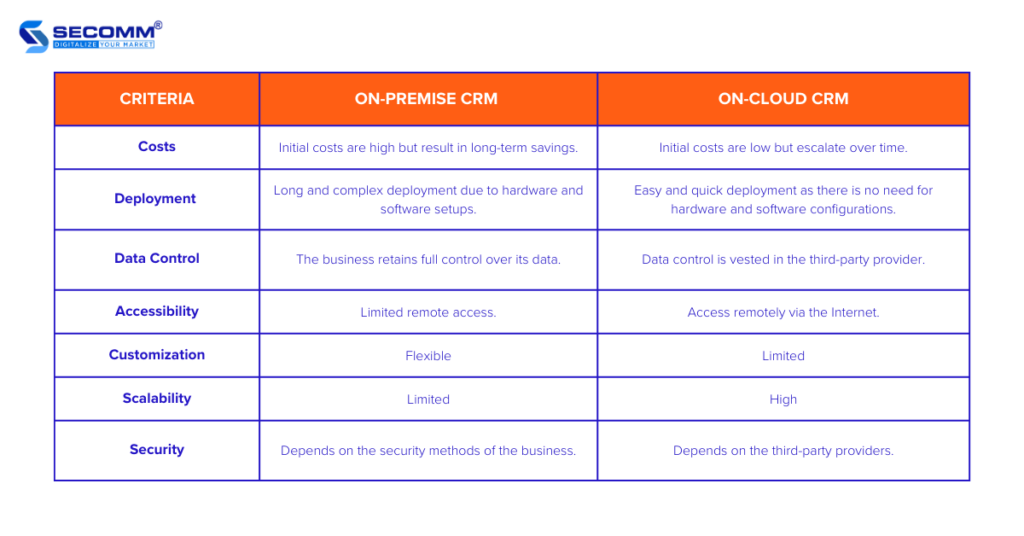Choosing between cloud-based CRM and on-premise CRM can be challenging. Both have their unique advantages and drawbacks.
Comparing these two options helps businesses make informed decisions. Cloud-based CRM offers flexibility and easy access, while on-premise CRM provides control and security. This comparison will guide you through the differences, benefits, and potential challenges of each. Understanding these can help you decide which CRM solution fits your business needs best.
Whether you prioritize accessibility or control, this guide will provide valuable insights. Keep reading to explore how each CRM type can impact your business operations and help you achieve your goals.

Credit: www.alliancetek.com
Cloud-based Crm
Choosing the right Customer Relationship Management (CRM) system can feel like a daunting task. With the rise of cloud technology, many businesses are shifting towards Cloud-Based CRM solutions. This modern approach to managing customer relationships offers a host of features and benefits that can significantly enhance your business operations. Let’s dive into the world of Cloud-Based CRM and explore its features and benefits.
Features Of Cloud-based Crm
Cloud-Based CRM systems are packed with features designed to streamline your business processes and improve customer interactions. Here are some key features:
- Accessibility: Access your CRM from anywhere, at any time. All you need is an internet connection.
- Real-Time Data: Keep your finger on the pulse with real-time updates and analytics.
- Scalability: Easily scale up or down based on your business needs.
- Integration: Seamlessly integrate with other business tools like email, calendars, and social media platforms.
- Automatic Updates: Enjoy automatic software updates without any downtime.
Benefits Of Cloud-based Crm
Why should you consider switching to a Cloud-Based CRM? Here are some compelling reasons:
- Cost-Effective: Save on hardware and maintenance costs. Pay only for what you use.
- Flexibility: Work from anywhere, whether you are at the office, at home, or on the go.
- Enhanced Collaboration: Teams can collaborate more effectively, sharing information and updates in real-time.
- Improved Security: Cloud providers offer robust security measures to protect your data.
- Quick Deployment: Set up and start using your CRM quickly, with minimal disruption to your business.
Switching to a Cloud-Based CRM can revolutionize the way you manage customer relationships. It not only enhances productivity but also ensures that your business remains agile and competitive in the ever-evolving marketplace. Have you made the switch yet?
On-premise Crm
When it comes to managing customer relationships, businesses often find themselves choosing between cloud-based and on-premise CRM solutions. While cloud-based CRM has been gaining popularity for its flexibility and accessibility, on-premise CRM has its own set of advantages that can’t be overlooked. Let’s dive into the world of on-premise CRM and see what makes it a compelling choice for many organizations.
Features Of On-premise Crm
On-premise CRM systems are installed and run on the company’s own servers. This means the business has complete control over the software and its data. Here are some standout features:
- Customization: On-premise CRMs can be tailored to meet the specific needs of the business. Custom fields, modules, and workflows can be added or altered.
- Data Security: Since the data is stored on local servers, businesses have direct control over their data security measures. This can be crucial for industries dealing with sensitive information.
- Integration Capabilities: On-premise CRM systems can be integrated with other on-site systems like ERP or custom-built applications, ensuring seamless data flow across the organization.
- Performance: With local installations, performance can be optimized according to the business’s hardware capabilities, potentially offering faster response times.
Benefits Of On-premise Crm
Opting for an on-premise CRM solution can offer several significant benefits, especially for businesses with specific needs and constraints. Here’s why some organizations prefer on-premise CRM:
- Enhanced Control: Businesses have full control over their CRM system, including when and how updates are applied. This allows for a highly customized and controlled environment.
- Cost Management: While the upfront cost can be higher, on-premise CRMs can be more cost-effective in the long run. There are no ongoing subscription fees, just maintenance and upgrade costs.
- Compliance: For companies in regulated industries, on-premise solutions can make it easier to comply with data protection laws, as they have direct oversight of their data storage and handling practices.
- Offline Access: On-premise CRMs do not rely on internet access, meaning users can still access their CRM data even if there is an internet outage.
Choosing between on-premise and cloud-based CRM can be like deciding between a home-cooked meal and dining out. Both have their perks, and the best choice often comes down to your specific needs and preferences. So, what will it be for your business?
Stay tuned as we explore the features and benefits of cloud-based CRM in the next section!
Cost Comparison
When it comes to choosing between a Cloud-Based CRM and an On-Premise CRM, understanding the cost implications is crucial. Each option comes with its own set of expenses, which can significantly impact your business’s budget. In this section, we’ll break down the Cost Comparison into initial costs and ongoing costs, helping you make an informed decision.
Initial Costs
First things first, let’s talk about the initial costs. When you opt for a Cloud-Based CRM, the startup costs are usually lower. Here’s why:
- No Need for Hardware: With a Cloud-Based CRM, there’s no need to invest in expensive servers or other hardware. Everything is hosted online.
- Software Installation: Forget about complex installation procedures. The software is ready to use from day one.
- Subscription Model: You typically pay a monthly or annual subscription fee, which is easier on the pocket initially.
On the flip side, an On-Premise CRM requires a significant upfront investment:
- Hardware Costs: You’ll need to purchase and maintain your own servers and other necessary hardware.
- Installation Fees: Setting up the software can be a complex and costly process, often requiring professional help.
- Licensing Fees: On-Premise CRM systems usually come with hefty licensing fees that must be paid upfront.
Ongoing Costs
Now, let’s delve into the ongoing costs. This is where the differences between Cloud-Based CRM and On-Premise CRM become even more apparent.
For a Cloud-Based CRM, ongoing costs are generally predictable and manageable:
- Subscription Fees: You continue to pay the subscription fees, which cover updates, support, and maintenance.
- Scalability: As your business grows, you can easily upgrade your plan without significant additional costs.
- Less IT Staff: Since most of the maintenance is handled by the service provider, you don’t need a large IT team.
On the other hand, an On-Premise CRM can bring unpredictable ongoing costs:
- Maintenance Costs: You are responsible for maintaining the hardware and software, which can be costly.
- Upgrade Fees: Upgrading the system often requires additional investments in new licenses and hardware.
- IT Staff: You’ll likely need a dedicated IT team to manage and troubleshoot the CRM system.
In summary, while Cloud-Based CRMs might seem more affordable initially and offer predictable ongoing costs, On-Premise CRMs can be more costly upfront and come with variable ongoing expenses. Weighing these factors carefully will help you choose the CRM solution that best fits your budget and business needs.

Credit: technologycounter.com
Security Considerations
Choosing between cloud-based CRM and on-premise CRM involves various factors. One of the most critical is security. Understanding security considerations helps in making an informed decision. This section will explore key aspects of security.
Data Security
Data security is vital for any CRM system. Cloud-based CRMs often have advanced security measures. They use encryption to protect data. Regular updates also enhance security. On-premise CRMs put security in your hands. You control the security protocols. This can be both an advantage and a challenge.
Compliance
Compliance with regulations is crucial. Cloud-based CRMs usually meet various compliance standards. They are designed to adhere to laws like GDPR. On-premise CRMs require you to manage compliance. You must stay updated with legal requirements. This can be time-consuming and complex.
Scalability And Flexibility
In today’s fast-paced digital era, businesses are increasingly looking for Customer Relationship Management (CRM) solutions that offer both scalability and flexibility. Whether you’re a burgeoning startup or an established enterprise, the ability to adapt to changing needs and grow seamlessly is crucial. But how do Cloud-Based CRM and On-Premise CRM stack up in this regard? Let’s dive into the nitty-gritty of their scalability and flexibility features.
Scalability Of Cloud-based Crm
When it comes to Cloud-Based CRM, scalability is one of its standout features. Imagine your business is like a balloon; you need a system that expands effortlessly as you grow. That’s precisely what Cloud-Based CRM offers. You can easily add more users, storage, or features without a hitch. No need for extra hardware or complex installations. It’s like upgrading your phone plan – just a few clicks, and you’re set!
Here are some key points:
- Ease of Expansion: Adding new users or increasing storage is as simple as updating your subscription.
- Cost-Effective: Pay only for what you use, making it budget-friendly.
- Automatic Updates: Enjoy new features and improvements without manual intervention.
Remember the days when expanding your business meant a major overhaul of your IT infrastructure? With Cloud-Based CRM, those days are long gone. This flexibility allows you to focus on what truly matters – growing your business.
Scalability Of On-premise Crm
On the flip side, On-Premise CRM systems offer a different kind of scalability. Think of it like building an extension to your house. It’s possible, but it requires more planning, time, and resources. You’ll need to invest in new hardware, software licenses, and possibly even more IT personnel to manage the expansion.
Consider these aspects:
- Hardware Limitations: Scaling often involves purchasing additional servers and storage solutions.
- Higher Upfront Costs: Significant initial investment is required for both hardware and software.
- Manual Upgrades: Implementing updates and new features can be time-consuming and may require downtime.
While On-Premise CRM systems provide a high level of control and customization, they lack the effortless scalability of their cloud-based counterparts. It’s a bit like owning a vintage car – great if you love tinkering and have the resources, but not as convenient as a modern ride.
In conclusion, when it comes to scalability and flexibility, Cloud-Based CRM systems clearly have the upper hand. They allow for seamless growth and adaptability without the heavy lifting required by On-Premise CRM systems. So, whether you’re a small business looking to expand or a larger enterprise seeking more agility, Cloud-Based CRM might just be the way to go.

Credit: www.scnsoft.com
Customization And Integration
Deciding between cloud-based CRM and on-premise CRM requires evaluating various factors. Two critical aspects to consider are customization and integration. These elements can significantly impact how well the CRM aligns with your business needs.
Customization Options
Cloud-based CRMs offer flexible customization options. Users can easily modify fields, workflows, and dashboards. Many providers offer drag-and-drop tools for customization. This makes it user-friendly for non-technical staff.
On-premise CRMs also allow for customization. They can be tailored to meet specific business requirements. However, this often requires IT expertise. Customizing on-premise CRMs can be time-consuming and costly. Businesses need to weigh these factors before deciding.
Integration Capabilities
Cloud-based CRMs are known for their seamless integration capabilities. They can easily connect with other cloud-based services. This includes email, marketing automation, and customer support tools. Integration is often straightforward and quick.
On-premise CRMs can also be integrated with other systems. This usually requires more effort and technical knowledge. Integration can be complex and may involve custom coding. Businesses should consider their internal IT resources.
Both types of CRMs offer unique advantages in customization and integration. Understanding your business needs will help you make the best choice.
User Experience
In the ever-evolving world of customer relationship management (CRM), the choice between cloud-based and on-premise solutions can significantly impact the user experience. Understanding how each option affects usability, accessibility, and overall satisfaction is crucial. Let’s dive into the user experience, focusing on two key aspects: ease of use and accessibility.
Ease Of Use
When it comes to ease of use, cloud-based CRM systems often shine. These platforms are designed with user-friendly interfaces that make navigation a breeze. Here’s why:
- Intuitive Design: Cloud-based CRMs are built to be intuitive. This means users don’t need extensive training to get started. Think of it like riding a bike; once you get the hang of it, you’re good to go.
- Regular Updates: Since the software is hosted in the cloud, updates are automatic. Users always have access to the latest features without the hassle of manual installations.
On the other hand, on-premise CRMs can be a bit more complex. They often require a steeper learning curve and more technical know-how. However, they offer greater customization. If you have a tech-savvy team, this might not be a big deal.
Accessibility
Accessibility is another area where cloud-based CRMs have the upper hand. Imagine being able to access your CRM from anywhere in the world, as long as you have an internet connection. Sounds great, right?
- Remote Access: Cloud-based CRMs can be accessed from any device, anytime, anywhere. This is perfect for teams that work remotely or are always on the go.
- Mobile Compatibility: Most cloud-based solutions have mobile apps, so you can manage customer relationships from your smartphone or tablet.
In contrast, on-premise CRMs are tied to your physical office location. If you need to access the system, you have to be on-site or use complex remote access solutions. This can be a significant drawback for businesses that require flexibility.
In conclusion, when it comes to user experience, cloud-based CRMs generally offer greater ease of use and accessibility. However, the best choice depends on your specific needs and the technical expertise of your team. Weigh the pros and cons carefully to find the perfect fit for your business.
Choosing The Right Crm
Choosing the right Customer Relationship Management (CRM) system can be challenging. Businesses must decide between cloud-based CRM and on-premise CRM. This decision impacts daily operations and long-term growth. Let’s explore the key factors to consider.
Business Needs
Every business has unique needs. Cloud-based CRM offers flexibility and accessibility. Employees can access it from anywhere with an internet connection. This suits businesses with remote teams. On-premise CRM, installed on company servers, provides more control. It might be a better choice for businesses with strict data security requirements.
Future Growth
Planning for future growth is crucial. Cloud-based CRM scales easily. Adding new users or features is simple. This makes it ideal for growing businesses. On-premise CRM may require more investment to scale. Additional hardware and maintenance could be needed. Consider your growth plans when making a choice.
Frequently Asked Questions
What Is The Difference Between Cloud Crm And On-premise Crm?
Cloud CRM is hosted online, accessible from anywhere. On-premise CRM is installed locally, offering more control but limited accessibility.
What Is The Difference Between Cloud-based And On-premise?
Cloud-based solutions are hosted on the internet, accessible from anywhere. On-premise solutions are installed locally on company servers.
What Are The Three Types Of Crm?
The three types of CRM are Operational, Analytical, and Collaborative. Operational CRM focuses on sales and customer service. Analytical CRM analyzes customer data for better decision-making. Collaborative CRM enhances communication between businesses and customers.
What Is A Cloud-based Crm?
A cloud-based CRM is a customer relationship management system hosted on remote servers. It enables access via the internet, providing flexibility and scalability for businesses. This solution helps manage customer interactions, streamline processes, and improve relationships.
Conclusion
Choosing between cloud-based CRM and on-premise CRM depends on your needs. Cloud-based CRM offers flexibility and easy access from anywhere. On-premise CRM provides more control and security over data. Consider your budget, IT resources, and data privacy. Both options have their strengths and weaknesses.
Evaluate your business requirements carefully. Make the decision that aligns with your goals. The right CRM can enhance customer relationships and improve efficiency. Make an informed choice for your business success.

